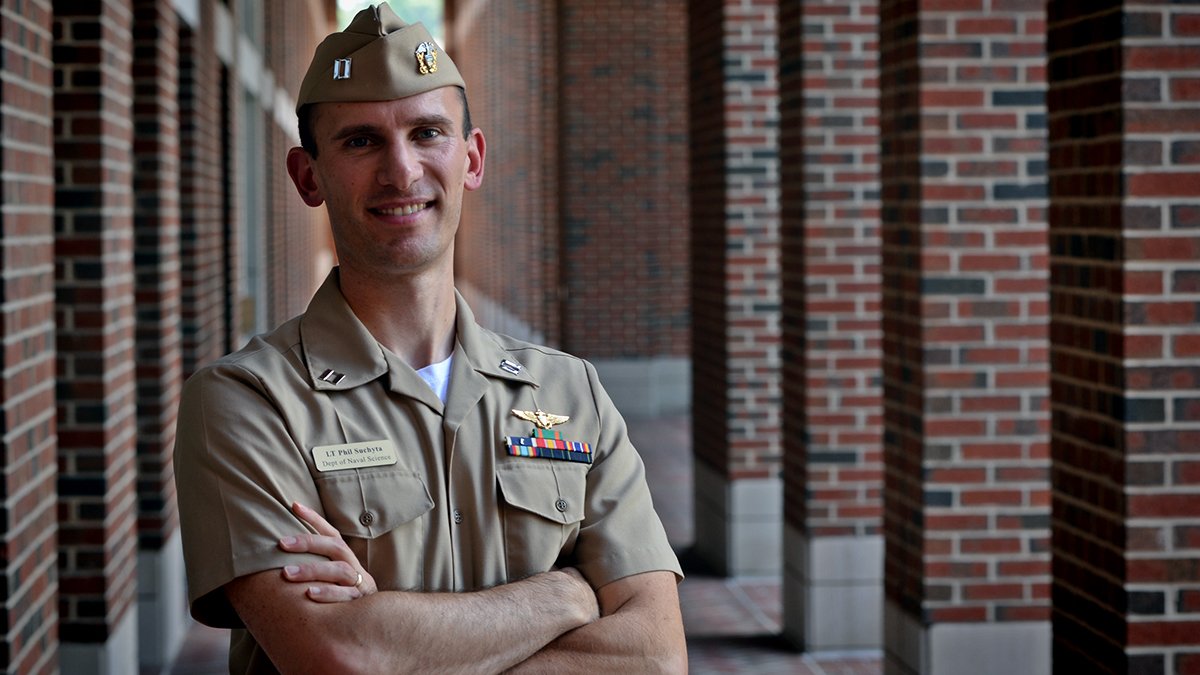A salute to MBAs in uniform
UNC Kenan-Flagler Business School's MBA@UNC program is helping military personnel or veterans achieve their goals of earning an advanced degree.

Color today’s MBA program at UNC Kenan-Flagler Business School red, white and Carolina blue. A quarter of the University of North Carolina at Chapel Hill’s online MBA students are either active-duty military or veterans, and their number is growing in UNC’s residential (4 percent) and executive (10 percent) MBA programs as well.
“MBA@UNC is perfect for active duty military students from a flexibility standpoint,” said John Radovan of the U.S. Air Force. “My dad always said, ‘Anything worth doing is worth doing right,’ and MBA@UNC does it right.”
UNC is at the crest of a national wave of military enrollments, according to statistics from MilitaryMBA.net. The organization’s latest survey in 2013 showed that military personnel or veterans made up 18.7 percent of all online MBA programs, as well as 7.7 percent of executive MBA and 4 percent of full-time MBA programs. At that time, UNC had the second highest percentage (21.3 percent) among the schools participating in the survey.
“Overall, I believe military enrollments in MBA programs will continue to grow slowly because 1 to 1.5 million active duty (service members) will be transitioning out of the military during the next 12 to 16 months,” said Greg Eisenbarth, executive director of Military MBA, an education network for military officers and noncommissioned officers.
MBA@UNC hasn’t done any special marketing to military personnel or veterans, said Susan Cates, executive director of the program and president of Executive Development at UNC Kenan-Flagler. But she acknowledged that UNC has a “strong brand with the military” because of the many military installations in the state.
“I am extremely proud of them as students,” she said of the online MBAs in uniform. “The rigor of the program is exactly the same, and they are juggling full-time jobs, taking care of kids and parents, traveling. I came through the full-time MBA program. I did it the easy way.”
With its emphasis on leadership skills and its relatively broad scope, the MBA is a natural choice for those seeking promotion in the ranks or transitioning from military to civilian life. “Some people call the MBA the general’s degree,” said Jason Perocho, a Navy veteran and full-time MBA student.
A graduate of the U.S. Naval Academy, Perocho was on the career path to be a Navy pilot. But when he contracted a rare form of cancer in flight school, the Navy allowed him to serve the remainder of his time at a desk job. He thrived as a Pentagon speech writer and then as program manager for the Under Secretary of Defense. Now he’s enrolled in the full-time MBA program at UNC. A native of New Jersey, he had never been to North Carolina before, but when he realized he could receive a free degree from a top 20 MBA program, he signed up.
Like many service members and veterans, Perocho is taking advantage of the Yellow Ribbon Program, part of the post 9/11 GI Bill that allows U.S. universities to contribute up to 50 percent of tuition costs that exceed public in-state tuition (the amount already covered). The Department of Veterans Affairs matches the contribution, meaning the service member or veteran gets an MBA (or other) degree for free. UNC is one of the schools that contributes the maximum 50 percent.
“Any program that can do that skyrockets to the top of the list,” Perocho said.
Phil Suchyta, an active duty Navy helicopter pilot, had also never been to North Carolina. But when he had to leave his squadron in San Diego in 2011 for “shore tour” as an ROTC instructor, UNC was one of his options. And when he talked to several people about the best school to teach at and get his own degree – and the best location for young professionals – UNC Kenan-Flagler came out on top.
“My background is in engineering, but I didn’t want an engineering degree,” he said. “An MBA seemed like the best fit. And the Weekend Executive MBA program was the best option.” Going to class at night and on some weekends, Suchyta will finish up his degree in October.
He has four to five years left to serve in the military and sees the MBA as a way to bridge the gap between military and civilian life. “It’s a good reset to your life,” he said. “It’s a good way for me to start thinking about next steps.”
Radovan, the Air Force MBA student, said that while he also thought of an MBA as a possible transition to civilian life, he finds himself benefitting from his classes right now. “The professional growth that I’ve experienced during my time with the program has led to a position promotion, process innovation reward and numerous other accolades,” he said. “In fact, I’m currently being considered for a job three levels above my current position that would increase my oversight from 11 individuals to 150.”




